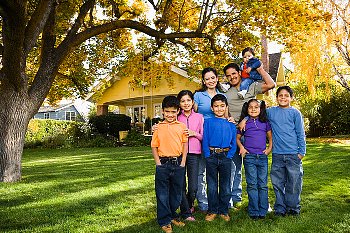
The benefits of having a large family are vast and involved, regardless of all the potential drama you may have experienced growing up, like when you told your mother something and 10 minutes later your tía is calling you to talk about it because your mother is worried. When you confront your mom about telling the world your issues, she says, “She’s my sister! She’s family! Who else am I supposed to talk to?”
Yes, the culture and relationships that emerge within a big family are beautiful things. According to research done in 2011, those parents with four or more children tend to be more fulfilled and happier than those with fewer children. Look at it this way: would you rather live in a town of 100 people or three?
In addition, the pride of passing along the family name from a father’s perspective is important and necessary. If there is no male heir, their legacy ceases to live on for the coming generations. Sometimes, the explanations are that simple.
For More About Family Relationships Among Latinos Like Us On Facebook!
Education Equals Birth Control
However, things have been changing in recent years especially with the influx of Latinos in college. Education, it has been said, is the greatest form of birth control, especially for women. The establishment of their careers and what can be done with the forward movement of the community starts to climb the ladder of priorities for those graduating with a Bachelor’s degree or higher.
Recently, Pew Research studies have shown that seven-in-10, or 69 percent, of Latino graduates in 2012 enrolled in college the same year, two percentage points higher than their white counterparts. So what does this mean?
Since about 2005, the birthrate among Latinos has been shrinking. As generations within the United States develop, Latino families have felt that one or two children complete their family. Their ideal have changed and averages for the size of families have dropped over time.
Recently, it has been found that teen birth rates have dropped 34 percent among Latinas from 2007 to 2011, according to the CDC. A part of this is attributed to the increase in college enrollment, especially by young Latinas.
Having a college education, in addition, typically causes women to have children later in their life than some 50 or 60 years ago when women were married right out of high school.
Along with education comes the desire to start and do well in a chosen career. The desire to succeed becomes instilled in native-born generations, progressing on the advantages that have been given to them.
While the desire to have children is still hefty among Latinos, the preparation to have a family is more apparent. If the sense of community and the importance of family survives in the mindset of future generations, the desire for big families will continue and result in the birth of more children.
It takes a village to raise a child, it is said. With that, the village has to survive.
